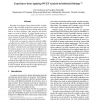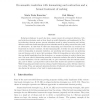64 search results - page 12 / 13 » Inductive Logic Programming: Derivations, Successes and Shor... |
ISORC
2007
IEEE
14 years 1 months ago
2007
IEEE
Knowing the program timing characteristics is fundamental to the successful design and execution of real-time systems. Today, measurement-based timing analysis tools such as in-ci...
FLOPS
2004
Springer
13 years 11 months ago
2004
Springer
This paper presents a self-applicable partial evaluator for a considerable subset of full Prolog. The partial evaluator is shown to achieve non-trivial specialisation and be effect...
AGP
1994
IEEE
13 years 11 months ago
1994
IEEE
Kowalski and Sergot's Event Calculus (EC) is a formalism for reasoning about time and change in a logic programming framework. From a description of events which occur in the...
VMCAI
2004
Springer
14 years 21 days ago
2004
Springer
Typed Assembly Languages (TALs) can be used to validate the safety of assembly-language programs. However, typing rules are usually trusted as axioms. In this paper, we show how to...
NGC
1998
Springer
13 years 7 months ago
1998
Springer
Reducing redundancy in search has been a major concern for automated deduction. Subgoal-reduction strategies, such as those based on model elimination and implemented in Prolog te...



